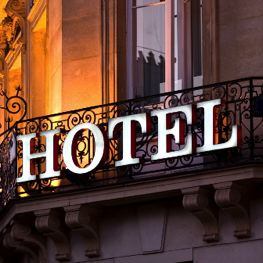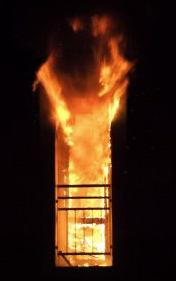 Do you know who to count on in case of a hotel emergency?
Do you know who to count on in case of a hotel emergency?
Matthew Stone reveals that knowing how hotel staff can help you—and how you can help the staff—in a hotel emergency is essential in protecting the lives of everyone.
I like hotel desk clerks. They are our welcome wagon after a long travel day.
They are ambassadors to their city, revealing hidden treats we would not find on our own.
They can help wake you up in the morning, arrange a ride to the airport, deliver your dry cleaning. But should you trust them with your life?
Consider this story: A California widow has filed a wrongful death suit against Kerzner International, the parent company of Atlantis Resort in the Bahamas. The plaintiff called the front desk when her husband was having heart attack symptoms, and they allegedly took too long to respond, perhaps contributing to his death. Courts will decide who is responsible, but there is an important lesson in the story.
 If you find yourself in a medical emergency situation while staying at a hotel, call 911, or thelocal emergency number. Sometimes the phone will ring automatically to the operator. In this case, insist they connect you to emergency services.
If you find yourself in a medical emergency situation while staying at a hotel, call 911, or thelocal emergency number. Sometimes the phone will ring automatically to the operator. In this case, insist they connect you to emergency services.
After you have spoken to emergency services, always call the hotel operator to notify them of the emergency. The hotel may have trained staff, but this is certainly not a guarantee; never assume that hotel security staff is trained beyond basic CPR, but you should still make that call.
The role of the operator is to ensure the ambulance or EMS team will be met and directed to your hotel room.
Hotels and resorts are large buildings with multiple entrances, so hotel staff can help direct the emergency response team to you in the most direct manner, saving valuable time.
 Fires are another emergency when the front desk is not necessarily to be trusted. A lot of the responsibility for safety rests with you.
Fires are another emergency when the front desk is not necessarily to be trusted. A lot of the responsibility for safety rests with you.
I am far from paranoid, but when I arrive at a hotel room, I take note of a couple things: 1) the nearest exits. Always know where at least two exits are, in case one is blocked, and 2) the emergency number in the city or country you are staying in (it is not always 911). If an alarm sounds (and I have experienced many), I am already prepared.
When you hear the fire alarm go off in a hotel, drop immediately to the floor. Don’t worry about getting dressed. Crawl to the door, put your hand on it and check to see if it’s hot. It’s hot, it means the fire may be outside your door or that the hallway is filled with smoke. Stay low and place wet towels around the bottom of the doorway to keep smoke out of the room.
If the door is not hot, calmly but quickly put on your shoes, pick up your wallet and room key, and evacuate the building swiftly via the nearest staircase, even if you are on the 30th floor.
And speaking of which, there’s not a fire department in the country that can easily fight a fire above the eighth floor, so it’s wise to pick a lower floor to begin with.
Calling the front desk is a useless and wasteful exercise in this scenario. There is a particularly terrifying story from the 1980s of a Houston hotel when the desk clerk told guests to ignore a fire alarm and 11 guests perished.
Learn more: How Safe Is My Hotel? An In-Depth Look At Hotel Security & Safety
 As a desk clerk and manager for many years, I can affirm that these calls to the front desk are not only annoying but dangerous.
As a desk clerk and manager for many years, I can affirm that these calls to the front desk are not only annoying but dangerous.
Remember that the desk clerk likely has a major role in guest safety and security, especially on an evening or night shift when there are not many employees in the hotel. They are the nerve center of the hotel, responsible for checking the fire panel, calling 911, communicating with the engineering and security staff, and meeting the fire trucks.
And here’s an interesting point: Most hotels will not give a refund for a fire alarm that was triggered. Certainly it is an inconvenience at 3 a.m., but the fire alarms are in place for guest safety. Ironically, the same people who would want a refund for the “inconvenience” may be the first ones to sue if they weren’t notified properly of the emergency.
Hotel emergencies are rare, so there is no need to pack fear in your suitcase. But remember in an emergency, the person best responsible for your health and safety is you.
By Matthew Stone for PeterGreenberg.com. Matthew Stone, a hotel industry veteran and author, is a lecturer at the Conrad N. Hilton College at the University of Houston. Visit him on the Web at www.globalpostmark.com.
Related links on PeterGreenberg.com:
- Travel Tip: Emergency Numbers In Foreign Countries
- Travel Tip: What To Do In Case Of A Hotel Fire
- How Safe Is My Hotel? An In-Depth Look At Hotel Safety & Security
- Hotels & Accommodations section
- Travel Safety & Security section
- Protecting Yourself From Terrorism Threats When Traveling
- The Early Show: Tips On Staying Safe In Hotels












